 Petzlover
Petzlover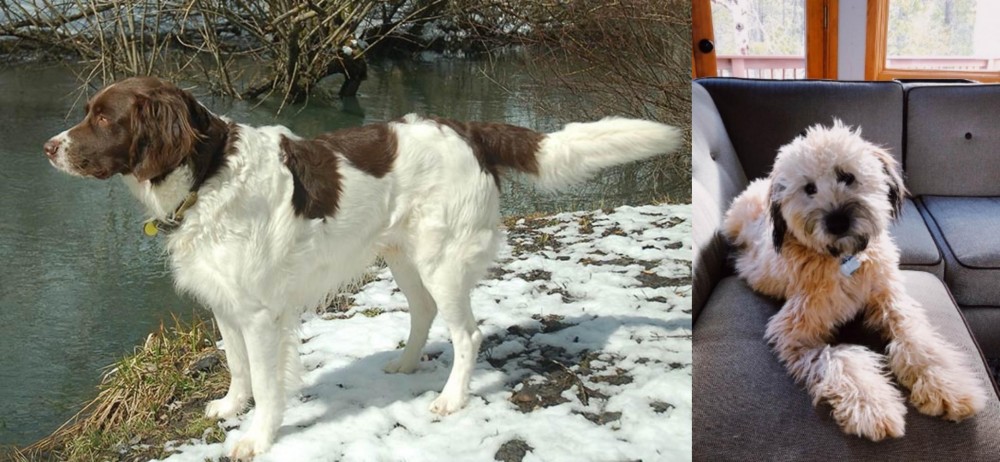 Drentse Patrijshond is originated from Netherlands but Whoodles is originated from United States. Drentse Patrijshond may grow 13 cm / 6 inches higher than Whoodles. Drentse Patrijshond may weigh 10 kg / 23 pounds more than Whoodles. Both Drentse Patrijshond and Whoodles has same life span. Both Drentse Patrijshond and Whoodles has same litter size. Both Drentse Patrijshond and Whoodles requires Moderate Maintenance.
Drentse Patrijshond is originated from Netherlands but Whoodles is originated from United States. Drentse Patrijshond may grow 13 cm / 6 inches higher than Whoodles. Drentse Patrijshond may weigh 10 kg / 23 pounds more than Whoodles. Both Drentse Patrijshond and Whoodles has same life span. Both Drentse Patrijshond and Whoodles has same litter size. Both Drentse Patrijshond and Whoodles requires Moderate Maintenance.
 The Drentse Patrijshond came about in the 1930-1950s. The breed developed from pointing dogs which originated in Spain, arriving in the Netherlands in the 16th century and being known as Partridge dogs.
The Drentse Patrijshond came about in the 1930-1950s. The breed developed from pointing dogs which originated in Spain, arriving in the Netherlands in the 16th century and being known as Partridge dogs.
The eastern part was known as the Province of Drenthe, and it is this area where these Partridge dogs were bred exclusively, not being mixed with other unknown breeds.
After World War II the Drentse Patrijshond was also recognized by the FCI. It was a popular dog in the Netherlands and the breed was also recognized by the Dutch Kennel Club in 1943. The Dretse’s popularity grew in other European countries too. In the 1960s some of the dogs entered the United States and in 2008 the Drentse Patrijshond Club of North America was established.
 Known also as the Wheatenpoo or the Wheatendoodle, the Whoodle is a teddy-bear kind of mixed-breed dog, being a cross between Poodles and the soft-coated Wheaten Terrier.
Known also as the Wheatenpoo or the Wheatendoodle, the Whoodle is a teddy-bear kind of mixed-breed dog, being a cross between Poodles and the soft-coated Wheaten Terrier.
He came about in the mid-1900s so he is still quite a new breed. Like with most hybrid breeds, the Whoodle doesn’t have a well-documented history.
Because most hybrids hail from the USA, one can assume that the Whoodle comes from there as well.
 The Drentse Patrijshond is a medium to large sized dog standing between 55 and 63cm in height and weighing anything between 18 and 30kg. He is a working dog and known by other names such as Dutch Partridge Dog and Dutch Gundog among others.
The Drentse Patrijshond is a medium to large sized dog standing between 55 and 63cm in height and weighing anything between 18 and 30kg. He is a working dog and known by other names such as Dutch Partridge Dog and Dutch Gundog among others.
The coat of the dog is medium length and dense and is mostly white with reddish brown markings. People looking at him liken him to a spaniel, pointer or setter kind of dog. He is athletic and muscular with a long feathery tail, floppy ears and a brown nose with amber colored eyes.
The Drentsche Patrijshond is an amicable family dog who is relaxed and calm around other pets in the home as well as children. In fact it is the kind of dog that forms a strong bond with his human family, not liking to be left alone.
He is a lively, alert and playful dog with a tendency to be a bit stubborn but this is easily dealt with when he undergoes training and socialization. He is an adaptable dog, being able to fit into life in the city or the countryside, just so long as his beloved owners are close by. However, he is very active and will require an owner who will take time out to take him on walks or involve him in lots of outdoor activities.
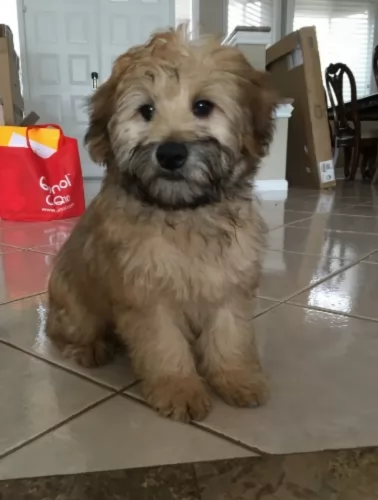 The Whoodle is a medium-sized dog that stands at between 30 and 50cm in height and weighs in the region of 9 to 20kg.
The Whoodle is a medium-sized dog that stands at between 30 and 50cm in height and weighs in the region of 9 to 20kg.
He has a silky, medium-length coat that can be fairly straight or wavy and which is available in a range of colors – black, brown, grey, cream and red.
He isn’t a heavy shedder, but their hair can grow fairly long so he will have to be groomed one way or the other. Many people choose to have him trimmed at the doggy salon. With the Poodle being in the mix, it is thought that the Whoodle coat is hypoallergenic, sought after by dog owners who suffer from allergies.
Just because of the dog breeds your Whoodle dog comes from, you can know that you’re going to have a playful, happy, friendly, outgoing, social pet who will have no doubt inherited a lot of good qualities from both parent breeds.
He will happily settle down with you in the city or the countryside. He absolutely loves human company and isn’t the kind of dog to be put outside for hours separated from his humans.
If there are children in the home, they’ll discover that this little dog is always up for a game. He gets on well with children and other pets. Early training and socialization will be imperative for the Whoodle as he is a strong-willed dog, inclined to be stubborn and you want to make sure he is obedient.
 The Drentse Patrijshond is a breed of dog that is particularly human orientated – just loving being around his human family.
The Drentse Patrijshond is a breed of dog that is particularly human orientated – just loving being around his human family.
He forms a deep bond with those that care for him and he can’t bear to be separated from his human family. The dog has always had a strong hunting instinct but these days this sweet, loyal dog is much more a devoted family pet who is more than happy to come indoors and make himself at home among his family members.
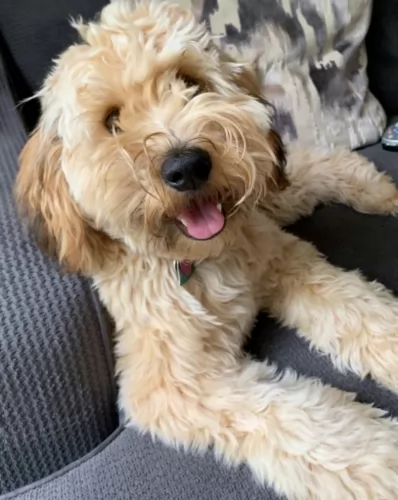 The Whoodle is a hybrid dog – a mix between the soft-coated wheaten terrier and the poodle.
The Whoodle is a hybrid dog – a mix between the soft-coated wheaten terrier and the poodle.
They make splendid pets and companions and are cheerful and intelligent, wanting to be constantly by your side.
Because both of the parents are working dog breeds, he is an active dog too, loving to take part in all the activities his family is busy with.
When you bring this little teddy bear of a dog into your home, you’re going to have years of benefiting from a true canine companion.
 The Drentse is a fairly healthy dog breed, with a life span of 12 to 15 years. No matter how healthy your dog, there will always be some health issues it may face. Environmental factors and diet can play an important part in his wellbeing.
The Drentse is a fairly healthy dog breed, with a life span of 12 to 15 years. No matter how healthy your dog, there will always be some health issues it may face. Environmental factors and diet can play an important part in his wellbeing.
Health concerns with this breed can include progressive retinal atrophy, hip dysplasia as well as hereditary stomatocytosis. This is a disorder that affects the dog’s cells walls.
Too much fluid gets into the cells and this damages red blood cells. Some breeds are more prone to this disorder, and the Drentse Patrijshond is one. It is an hereditary disorder that results in chronic anemia and liver disease.
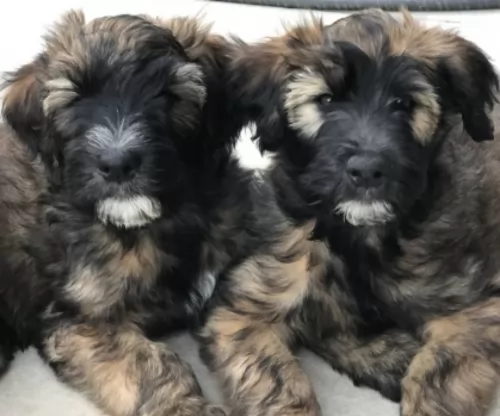 The Whoodle is considered to be a healthy little dog but they can suffer from some of the many common dog illnesses there are. It’s important to feed your dog well and to exercise him to ensure his good health. Some of the common health problems he could suffer with -
The Whoodle is considered to be a healthy little dog but they can suffer from some of the many common dog illnesses there are. It’s important to feed your dog well and to exercise him to ensure his good health. Some of the common health problems he could suffer with -
It is important to ensure your Whoodle has his vaccines to prevent some of the deadly canine diseases there are.
Also, it is a good idea to have your pet neutered or spayed to prevent an unwanted litter. Spaying and neutering have health benefits for your pet, so it is a good idea to have this done for them.
 This dog is quite a heavy shedder, but even so, he won’t need professional grooming – just a good brushing twice a week.
This dog is quite a heavy shedder, but even so, he won’t need professional grooming – just a good brushing twice a week.
The teeth will need to be brushed 2 or 3x a week and because he has floppy ears, these will need to be checked for infection. It’s a good idea to clean them with some special dog ear cleanser, but if you’re not sure how, your vet or a professional groomer can do it for you.
Cut your dog’ nails, but once again if you think you might cut into the quick of the nail, causing bleeding and pain, a professional groomer can do it for you.
The Drentsche Patrijshond will require quality dry dog food. Speak to your vet about the best kibble that ensures your pet gets his full quota of vitamins and minerals. Add in cooked brown rice, vegetables and chicken from time to time and include some raw meat wherever possible. Adding in some raw meat helps to stave off dry, red, irritated skin. Your pet will also need access to fresh, cool water day and night.
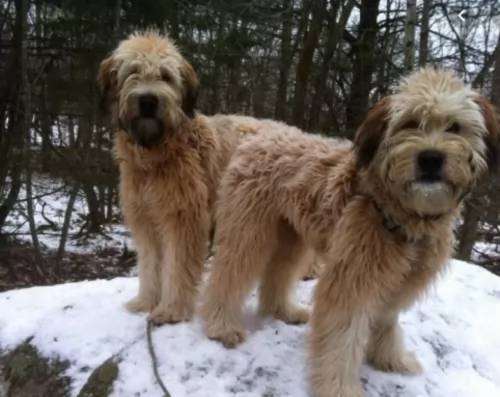 Apart from your Whoodle requiring regular nail trimming, you will want to brush him twice a week to keep their coat free from matting. Some Whoodle owners prefer to have their pets professionally groomed.
Apart from your Whoodle requiring regular nail trimming, you will want to brush him twice a week to keep their coat free from matting. Some Whoodle owners prefer to have their pets professionally groomed.
Check inside his mouth while grooming to ensure there are no bad teeth. This could cause your pet a lot of pain and he has no way of telling you this.
As a medium-sized dog, you want to feed your pet a commercially manufactured dog food that has been formulated for a medium-sized dog and one with lots of energy.
Their dietary needs change from puppyhood to adulthood and where the puppy received 4 bowls of food a day, the adult Whoodle will require 2. Always buy the best quality food you can as the choice of food you provide has a huge impact on his health.
Some home-made food is always a good idea too but it needs to be simple and plain, without any exotic spices. Boiled chicken, rice and vegetables is always a splendid choice and it can be added to the dry kibble as a supplement.